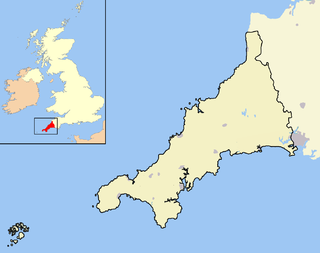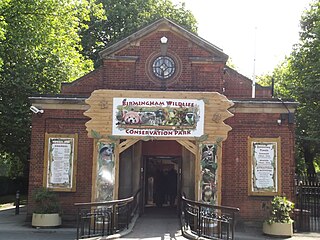
The Cornwall Wildlife Trust is a charitable organisation founded in 1962 that is concerned solely with Cornwall, England, United Kingdom.

The Wildlife Trusts, the trading name of the Royal Society of Wildlife Trusts, is an organisation made up of 46 local Wildlife Trusts in the United Kingdom, the Isle of Man and Alderney. The Wildlife Trusts, between them, look after more than 2,300 nature reserves, covering around 98,500 hectares. As of 2020, the Trusts have a combined membership of over 870,000 members.

The dawn chorus is the outbreak of birdsong at the start of a new day. In temperate countries this is most noticeable in spring when the birds are either defending a breeding territory, trying to attract a mate or calling in the flock. In a given location it is common for different species to do their dawn singing at different times.
Warwickshire Wildlife Trust is a Wildlife Trust and Registered Charity covering the county of Warwickshire and Solihull and Coventry in the county of West Midlands, England. The Trust aims to protect and enhance wildlife, natural habitats and geology throughout Warwickshire, Coventry and Solihull.

The Staffordshire Wildlife Trust (SWT) is a wildlife trust covering the county of Staffordshire, England.

Wiltshire Wildlife Trust is a conservation charity based in Devizes, England which owns and manages 40 nature reserves in Wiltshire and Swindon. It also works to encourage Wiltshire's communities to live sustainable lifestyles that protect the environment.
Dorset Wildlife Trust (DWT) is a wildlife trust covering the county of Dorset, United Kingdom. The trust was founded in 1961 as Dorset Naturalists' Trust, to protect and conserve the wildlife and natural habitats of the county.
The Gloucestershire Wildlife Trust is the Gloucestershire local partner in a conservation network of 46 Wildlife Trusts. The Wildlife Trusts are local charities with the specific aim of protecting the United Kingdom's natural heritage. The Gloucestershire Wildlife Trust is managed by a board of trustees elected from its membership who provide overall direction for the development of the trust and there are advisory committees. The work of the trust is carried out through staff and volunteers.
Cumbria Wildlife Trust is a wildlife trust covering the county of Cumbria, in North West England. It runs more than 40 nature reserves, and aims to broaden the awareness and knowledge of the wildlife in the county.

Durham Wildlife Trust is a registered charity that was established in 1971, originally as the Durham County Conservation Trust, becoming Durham Wildlife Trust in 1988. The Trust operates across the area of the old County Durham, which includes Darlington, Gateshead, South Tyneside and Sunderland.

Moseley Bog and Joy's Wood Local Nature Reserve, formerly The Dell, is a Local Nature Reserve in the Moseley area of Birmingham, England, with an area of about 12 ha. Along with the nearby Sarehole Mill, and a number of other sites, it forms part of the Shire Country Park.

The North Wales Wildlife Trust (NWWT) is the Wildlife Trust for North Wales. Established in 1962, it covers the vice counties of Anglesey, Caernarfonshire, Merionethshire, Denbighshire and Flintshire with over 9300 members. It is a registered charity and a member of the Wildlife Trusts Partnership with the head office being located in Bangor and its eastern office located at Aberduna nature reserve in Flintshire.

Yorkshire Wildlife Trust is a charitable non-governmental organisation, one of the UK's 46 county-based Wildlife Trusts. Its focus is nature conservation and it works to achieve a nature-rich Yorkshire with healthy and resilient ecosystems that support both Yorkshire's wildlife and its people.
Chris Baines is an English naturalist, one of the UK's leading independent environmentalists. He is a horticulturalist, landscape architect, naturalist, television presenter and author.

Birmingham Wildlife Conservation Park, formerly Birmingham Nature Centre, and before that Birmingham Zoo, is a small zoo on the edge of Cannon Hill Park in Birmingham, England. It is owned and managed by Birmingham City Council.

London Wildlife Trust (LWT), founded in 1981, is a local nature conservation charity for Greater London. It is one of 46 members of the Royal Society of Wildlife Trusts, each of which is a local nature conservation charity for its area. The Trust aims to protect London's wildlife and wild spaces, and it manages 36 nature reserves in Greater London. The Trust provides education services for schools. Local groups work on reserves and organise walks.
Gwent Wildlife Trust (GWT) is a wildlife trust covering the area between the lower Wye and Rhymney rivers which forms the vice county of Monmouthshire in south-east Wales. It is a registered charity and a member of the Wildlife Trusts Partnership.

Birmingham has 591 parks and open spaces, totalling over 3,500 hectares (14 sq mi), more than any other equivalent sized European city. The centrepieces of Birmingham's park system are the five Premier Parks. Fifteen parks have received the prestigious Green Flag Award. The city also has five local nature reserves, one national nature reserve and a number of Wildlife Trust nature reserves.
Nature Improvement Areas (NIAs) are a network of large scale initiatives in the landscape of England to improve ecological connectivity and improve biodiversity. They were launched in 2012.
Deer's Leap Wood is a nature reserve of the Wildlife Trust for Birmingham and the Black Country, in West Midlands, England. There is woodland with a variety of tree species; also a pond and a meadow area.












